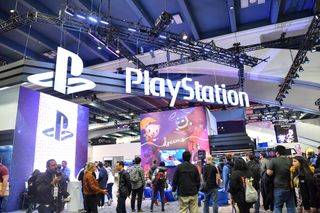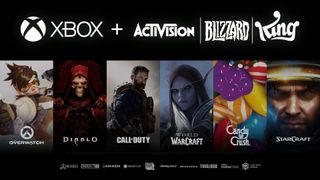Sony knows it won't lose Call of Duty to Xbox exclusivity. Here's what it's really about.
PlayStation is using bad faith arguments to try and manipulate regulators.

Sony is once again pleading with regulators to block the Activision-Blizzard deal from Microsoft, which would see the Xbox and Windows firm gain control over major franchises like Call of Duty and Diablo.
Naturally, Xbox is Sony's biggest competitor in the console space, with PlayStation remaining the dominant platform in virtually every major market, if not all of them. Xbox has aggressively fought back, using high-value offerings like the more affordable Xbox Series S, and the all-you-can-eat subscription gaming service Xbox Game Pass. Microsoft also seeks to compete with Amazon and other cloud companies in the nascent cloud gaming space, by bringing Xbox games to phones, tablets, and the web via streaming.
The deal for Activision-Blizzard is one of the largest and most ambitious in history, let alone the gaming industry, and any deal of this size which involves the lives of thousands of employees should of course be scrutinized. However, the arguments from its biggest detractor ring hollow when you cast even a cursory glance over the reality of the situation, and Sony may not like what regulators find.
Sony's goal is to reduce and hinder competition

This week, the UK competition regulator (known as the CMA) announced its intention to move ahead with a deeper investigation into the $70 billion Activision-Blizzard deal, which would see Microsoft gain ownership of franchises like World of Warcraft, Candy Crush, and Call of Duty. The latter of the list here being the most contentious.
Call of Duty remains one of, if not the most profitable video game franchise in the world. Its retail sales year in, year out amount to a commerce ritual, selling millions of units without fail, and then millions more microtransactions on top. The free to play version Call of Duty Warzone is also a huge driver of revenue, and competes up there with the likes of Fortnite, Valorant, and Apex Legends.
Sony has signalled its displeasure with the deal to different sets of regulators, including Brazil and most recently the UK, with a showdown likely to take place in the European Union soon as well. In a statement (via Eurogamer), Sony implied that the deal would "harm gamers," which is ironic given its focus on buying up exclusivity deals across mountains of other games in recent years, but we'll get into that later.
"By giving Microsoft control of Activision games like Call of Duty, this deal would have major negative implications for gamers and the future of the gaming industry. We want to guarantee PlayStation gamers continue to have the highest quality gaming experience and we appreciate the CMA's focus on protecting gamers."
Get the Windows Central Newsletter
All the latest news, reviews, and guides for Windows and Xbox diehards.
Obviously, "gamers" in this context refers only to PlayStation users, yet the cynical and emotional framing here seems to imply that only their users matter, and that gamers on Nintendo Switch, Xbox, or PC aren't relevant in the debate somehow. But I digress. Either way, Sony's arguments are vague here, and in previous comments, they seemed to imply that Microsoft would limit or remove access to Call of Duty from PlayStation platforms.
Microsoft has supported Minecraft on PlayStation to the same extent and degree as it has supported Minecraft on Xbox and Windows. Fallout 76 and Elder Scrolls Online get updates and expansion parity day one on PlayStation as well. It's Sony who has become notorious for removing content from the Xbox versions of multiplatform games. It's Sony who led the jacking up of console games to $70 and even more in other territories. And it's Sony who arbitrarily slapped a price hike on PlayStation consoles outside of the U.S. recently — so who exactly is harming gamers here?
But again, I digress. This is a business, and Sony is merely protecting its interests. But to suggest its interests are somehow to the benefit of "the gaming industry" and "gamers" goes beyond bad faith, it's simply a lie.
Sony isn't losing Call of Duty, it's losing its ability to obfuscate

In another statement to Eurogamer, Microsoft responded to Sony's "concerns" with what is painstakingly obvious: "It makes zero business sense for Microsoft to remove Call of Duty from PlayStation given its market leading console position." Sony knows this. We all know this. The UK regulator may be too dumb to know this. Thankfully, Microsoft will presumably have the opportunity to pull out some crayons and very slowly try to explain it to them — and Sony may not like what could happen if it gets to that point.
It could be argued that, given what we learned from the hilarious Epic Games vs. Apple court case a while ago, that regulators find that it is in fact, Sony, who is anti-competitive and bad for the games industry. From its exclusivity deals that keep games away from Windows PC, Xbox, and Nintendo Switch to its developer-hostile practice of charging a tax for games that dare to allow connectivity with competing platforms.
Sony's business strategy has long revolved around killing Xbox, but the company has ramped up on that even further in recent years, deploying subtle and not-so-subtle strategies to obfuscate the Xbox platform, and seed doubt in Microsoft's operation. Games like Final Fantasy 7 Remake were listed with timed exclusivity periods when they were announced, but they still remain locked away from Xbox to the confusion of fans who may have been waiting for it. Games like the upcoming Harry Potter title Hogwarts Legacy will have exclusive content for PlayStation, and we all remember the notorious situation with Destiny, where entire missions were cut from the Xbox version, essentially making the Xbox version less valuable. Sony has been cornering an entire genre with fighting games exclusivity since it bought up Street Fighter V, while also restricting cross-play on games that weren't exclusive. How is that good for the industry exactly?

And sure, all of this is just business. Microsoft has done it in the past, especially during the Xbox 360 era. The outcry in the media for Microsoft's exclusivity deal for Rise of the Tomb Raider was thick and fast and has since seen Microsoft to shy away almost entirely from major AAA exclusivity deals to Sony's benefit. But herein lies the truth of Sony's fears revolving around Call of Duty.
Sony isn't afraid of losing Call of Duty exclusivity. They aren't even afraid of losing occasional pieces of content to Call of Duty. What they're afraid of is gamers getting better value with Xbox Game Pass. They're afraid of losing the ability to dictate the rules over how gaming operates. Epic Games has shown itself to wield its userbase as a weapon in arguing against taxes like Sony's cross-play fee for developers. Is there a world where Epic Games and Microsoft band together to try and force Sony to remove the walls to cross-play all together? Surely it would only benefit gamers if I don't have to check and double check whether or not I can play online with my friends, regardless of platform. Nintendo doesn't block cross-play, Steam and Xbox don't block cross-play — it's Sony who blocks cross-play, and they do it to make it harder for users to choose anything other than the biggest platform. You know, limiting consumer choice per what regulators are supposed to, erm, regulate.
The hard truth is that the Activision-Blizzard deal is not just good for Xbox. It's quite literally the opposite of what Sony says: it's going to be good for all gamers, and the industry as a whole.
The Activision deal is good for ALL gamers, not just Xbox

Sony's arguments are in bad faith. They know they're not going to lose Call of Duty. They know they're not going to lose games like Overwatch or Diablo, which rely on large player bases. We know from how Microsoft has handled Minecraft, Elder Scrolls Online, and Fallout 76 how they'll handle Call of Duty on PlayStation, and Sony knows it more than anyone. If Call of Duty is so important, how does Nintendo function without it?
The only people who lose out in this equation are Sony's execs and their millionaire shareholder class, who will see PlayStation's clout to dictate prices and anti-competitive practices like cross-play blocking diminished.
I'm often accused of having Xbox bias for wanting this deal to go through — but the truth is pretty simple for me, this has nothing to do with Xbox. I barely play Call of Duty, for me, I couldn't care less if Call of Duty went exclusive to PlayStation forever. My biases lie only in what is good for Activision's developers, the games they make, and the people who play those games. It's my belief that games like Diablo Immortal would be far less user-hostile under Microsoft. It's my belief that World of Warcraft will see new investment to grow under Microsoft, and Xbox lead Phil Spencer essentially hinted as much in a previous interview.
I believe franchises like Heroes of the Storm and Starcraft could see revived player bases with Xbox Game Pass perks. I could see dormant franchises like Prototype or Spyro being revived under Microsoft. The additional studios and expertise could help revive Microsoft IPs like Banjo Kazooie. I can see Call of Duty coming to Nintendo Switch under Microsoft, either via the cloud or natively in a lighter-weight version. We'll also get better value, with all of these titles under Xbox Game Pass, which is available quite literally everywhere and anywhere. Even if you don't own a gaming PC to play these titles natively, an Xbox Series S is incredibly affordable, and Microsoft may even opt to return the PlayStation versions back to $60, given its stubbornness to follow industry trends here.
In any case, none of this will happen if Activision remains independent, owing to the company's fast-profits-above-everything shareholder culture.

Under a platform holder, all of Activision's franchises would find new life with Microsoft, whose performance is judged by growth in business and Azure over raw gaming profits. Xbox is part of that cloud growth, largely giving Xbox more breadth to explore reviving franchises like Flight Simulator, Age of Empires, and the upcoming Fable reboot. I feel like none of these would have happened under Activision-Blizzard, who is essentially tasked with chasing the next major trend to earn its hedge funds a quick buck at the expense of everything else — and Sony would still be the top gaming company by profits and revenue.
You don't want to live in a world where Sony is the only major platform holder, given that they have shown willingness to jack up the prices of their consoles as recently as a few weeks ago. You don't want to live in a world where Sony can freely dictate how much AAA console games cost, or where and how you can play them. Xbox's merger with Activision would force Sony to compete harder for consumers and would by no means harm their market position in the short term, and neither the long term if PlayStation keeps delivering with their industry-leading AAA action games. And there's no suggestion whatsoever that they're going to slow down in that space.
The final truth is, at the end of the day, this is all to prevent consumers (you) from getting a better deal with Xbox Game Pass. If that's what it boils down to in court, Sony may struggle to present that argument in a positive light.

Jez Corden is a Managing Editor at Windows Central, focusing primarily on all things Xbox and gaming. Jez is known for breaking exclusive news and analysis as relates to the Microsoft ecosystem while being powered by tea. Follow on Twitter @JezCorden and listen to his XB2 Podcast, all about, you guessed it, Xbox!
